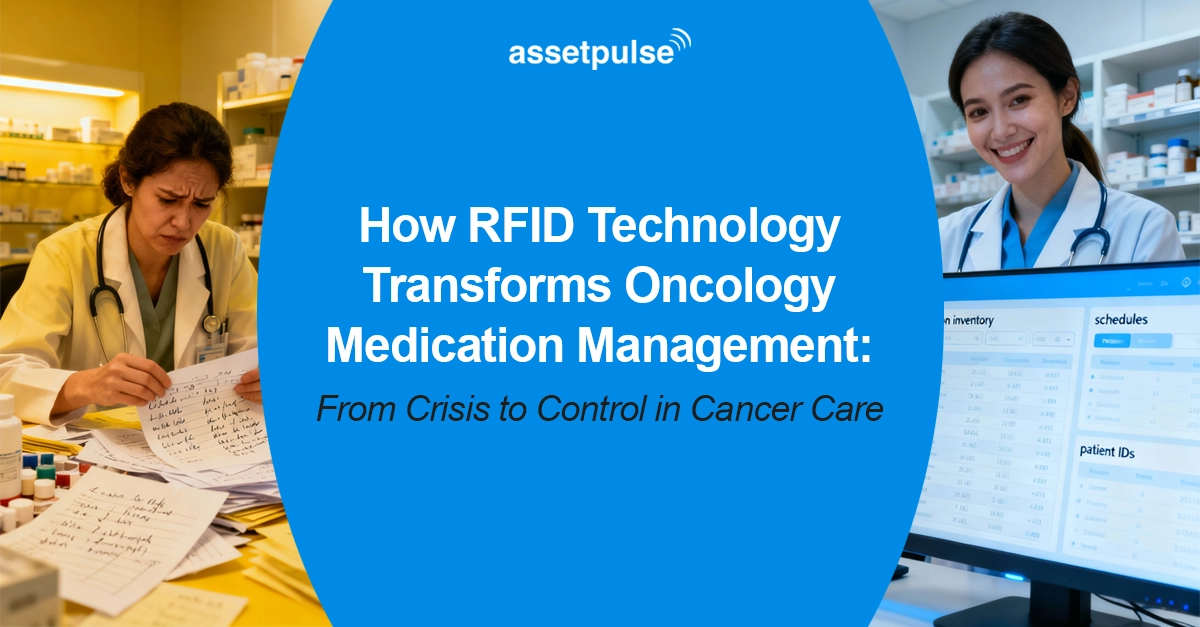Your infusion center is packed with patients ready for chemotherapy. Suddenly, the pharmacy team discovers they’re missing a critical oncology drug. The next hour becomes a frantic search across multiple locations, delayed treatments, and anxious patients. This scenario repeats daily across cancer centers.
If you’re leading oncology pharmacy operations, managing cancer center logistics, or overseeing medication safety in healthcare systems, you’ve likely lived through scenarios like this. The situation is clear: traditional medication tracking methods are failing the most vulnerable patients when they need care most.
Ready to Revolutionize Your Oncology Medication Management?
Discover how RFID transforms medication tracking for safer cancer care!
Get Free ConsultationThe Hidden Crisis in Oncology Medication Management
Cancer care has evolved dramatically, but medication management systems haven’t kept pace. Today’s oncology pharmacies face unprecedented challenges that manual tracking simply cannot address.
High-Stakes Inventory Demands
Modern oncology medications represent some of healthcare’s most expensive and complex therapeutic agents. These medications often have strict temperature requirements and limited stability once prepared. When managing hundreds of high-value medications across multiple care sites, traditional spreadsheet tracking becomes inadequate.
This complexity extends beyond basic inventory control. The decentralization challenge creates additional layers of difficulty as healthcare systems increasingly deliver oncology services across distributed networks – from main hospital campuses to ambulatory infusion centers and satellite clinics.
The Decentralization Challenge
This distributed care model creates inventory silos where expensive medications might expire unused at one location while desperately needed at another. The lack of real-time visibility across these networks leads to both patient delays and significant financial waste.
Compounding these operational challenges is the regulatory environment that governs oncology medication management.
Regulatory Compliance Pressure
Oncology medications face stringent FDA oversight and detailed documentation requirements. Every movement, every temperature excursion, every handling event must be tracked and reported. Manual documentation systems create compliance risks that can result in costly regulatory actions and, more importantly, patient safety concerns.
The Real Cost of Outdated Tracking Systems
Treatment delays in oncology aren’t just inconvenient – they can be life-altering. When patients must reschedule chemotherapy sessions due to medication unavailability, it disrupts carefully planned treatment protocols and adds emotional stress to an already difficult journey.
These operational failures have cascading effects throughout the cancer care continuum, affecting not just individual patients but entire care teams and healthcare systems.
Want to Eliminate Delays in Cancer Care with Smart Medication Tracking?
See how RFID slashes treatment delays with real-time medication visibility!
Get Free ConsultationRFID Technology: The Game-Changer for Oncology Operations
Radio Frequency Identification (RFID) technology offers oncology leaders a path from reactive crisis management to proactive operational control. Unlike barcode systems that require line-of-sight scanning, RFID enables automatic, live tracking of medications throughout entire healthcare networks.
Instant Visibility Across Your Network
RFID transforms medication tracking from a manual, location-by-location process into an automated, system-wide capability. Pharmacy directors can instantly locate any specific oncology agent across infusion suites, cleanrooms, and satellite pharmacies with just a few clicks. During medication shortages, which affect oncology more than any other specialty, this visibility enables immediate redistribution decisions that keep treatment schedules on track.
This real-time visibility extends beyond simple location tracking to encompass the entire medication lifecycle.
Proactive Expiration Management
Smart RFID systems continuously monitor medication expiration dates and automatically alert teams when products approach their beyond-use dates. This proactive approach enables systematic redistribution of medications from lower-volume to higher-volume locations, dramatically reducing waste.
The benefits extend into specialized pharmacy operations where precision and efficiency are paramount.
Sterile Compounding Efficiency
Cleanroom operations represent one of oncology pharmacy’s most resource-intensive functions. RFID technology allows remote inventory verification without requiring staff to don protective equipment or interrupt sterile compounding workflows. This capability alone can increase cleanroom productivity while maintaining the highest safety standards.
Beyond operational efficiency, RFID technology directly supports patient safety and care quality.
Enhanced Patient Safety and Experience
RFID systems create comprehensive audit trails for every medication movement, supporting rapid recall management and diversion prevention. More importantly for patient experience, automated inventory management ensures infusion centers maintain adequate stock levels, reducing treatment delays that cause anxiety and disruption for cancer patients and their families.
Need Real-Time Visibility into Your Oncology Medication Inventory?
Find out how RFID delivers instant inventory insights across all care sites!
Get Free ConsultationThe Future of Oncology Medication Management
Healthcare systems increasingly recognize that specialty pharmacy operations require specialized solutions. Generic inventory management approaches simply cannot address the unique demands of high-cost, temperature-sensitive oncology medications with strict compliance requirements.
RFID technology represents more than just an operational upgrade – it’s a strategic investment in patient care quality. As oncology treatments become more personalized and complex, the ability to maintain precise medication control becomes essential for cancer centers seeking to attract and retain patients.
The transformation extends beyond individual healthcare facilities to encompass entire health systems and care networks.
Supporting Distributed Care Networks
As more oncology services shift to outpatient and ambulatory care settings, coordinated inventory strategy becomes essential. RFID-enabled systems serve as connective tissue in these decentralized environments, providing inventory transparency across all points of care.
This systematic approach enables therapeutic interchange and accurate forecasting during shortages, optimized reallocation through real-time inventory visibility, and enhanced regulatory compliance through detailed usage logs.
Taking the Next Step Forward
The transition to RFID-enabled oncology medication management isn’t just about adopting new technology – it’s about embracing a fundamental shift from reactive problem-solving to proactive patient care excellence.
Today’s oncology patients deserve the precision, safety, and efficiency that modern technology can deliver. Pharmacy teams deserve tools that eliminate frustrating searches and enable them to focus on patient care rather than inventory logistics.
RFID technology offers proven solutions to the medication management challenges facing oncology operations. The momentum toward RFID adoption in oncology pharmacy reflects a broader shift in mindset: from reactive inventory management to proactive, data-driven oversight.
Ready to Transform Your Oncology Operations?
The path from crisis to control begins with understanding how automated medication tracking can revolutionize oncology operations. RFID technology helps oncology teams rise to the complexity of modern cancer care by reducing uncertainty, enhancing safety, and freeing clinical staff to focus on patients rather than logistics.
Contact RFID solution providers today to explore how automated medication tracking can revolutionize your oncology operations. Your patients and your operations will benefit from making this critical investment in care quality and efficiency.



